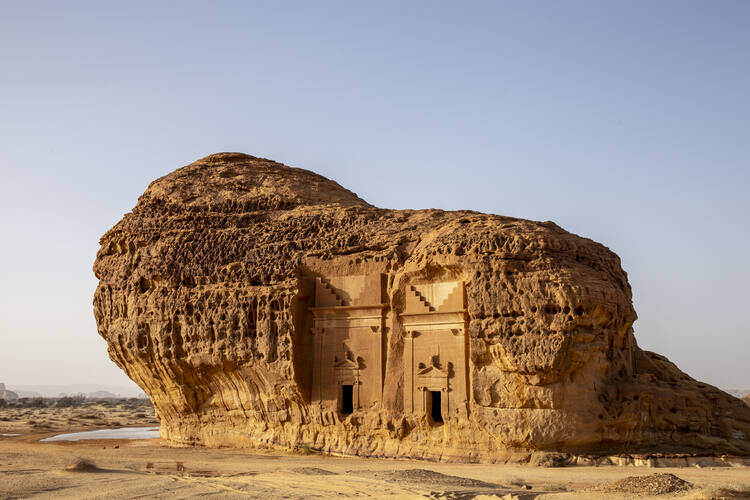
The Centre Pompidou appears to be expanding to Saudi Arabia as part of a broader cultural collaboration with France.
According to a report published by Le Monde, the museum is in the process of signing a one-year €2 million ($2.1 million) contract with Saudi authorities to establish a new contemporary art venue in the ancient region of AlUla, home to the remnants of 2,000-year-old sandstone buildings and tombs carved by craftspeople of the Nabatean tribe.
The proposed institution, called Perspective Galleries, will belong to a broader cultural complex at the site conceived by the Saudi Crown Prince Mohammed bin Salman Al Saud in partnership with French President Emmanuel Macron.
Lebanese architect Lina Ghotmeh has been tapped to design Perspective Galleries, while experts from the Pompidou will weigh in on topics such as conservation and educational strategy. The Paris museum will also put together a five-year strategy for exhibitions and the loan of works, Le Monde reported.
If realized, Perspective Galleries will become the latest entrant in the Pompidou’s growing network of satellite locations worldwide, joining outposts in Brussels, Jersey City, Malaga, and Shanghai—all of which opened within the last decade.
Representatives from the Pompidou did not immediately respond to a request for more information about the deal, nor did a spokesperson for the French Agency for AlUla Development (AFALULA). It’s unclear when construction on the new museum is expected to begin and end.
Rendering of the Nabataean District’s Nabataean Theater in AlUla. Image ©Royal Commission for AlUla.
In April 2018, the two countries inked a 10-year deal In which France would support Saudi Arabia’s $15 billion plan to turn Al-Ula into an international cultural destination replete with museums, archeological treasures, and a new tramway system. The project’s three planned stages are expected to be completed in 2023, 2030, and 2035.
This week, Saudi Arabia’s Royal Commission for AlUla and the AFALULA jointly shared details about Villa Hegra, another planned AlUla addition that is being billed as a new “incubator for artists and creators, structured around several complementary cultural spaces.”
A Franco-Saudi jury selected Lacaton and Vassal, a Paris-based architectural agency that won the 2021 Pritzker Prize, to design the new venue, while former Château de Chantilly head Fériel Fodil has been appointed chief executive officer.
Though the Villa’s opening is still likely years away, the institution will launch its first programs in 2023. Planned for the year are artist residencies, open-air performances, workshops for kids, and an unspecified art commission.
This is indeed a milestone in the history of the conception of this cultural institution of reference, dedicated to arts and culture, which seals the artistic dialogue initiated between France and Saudi Arabia and, more broadly, between European and Arab cultures,” Gérard Mestrallet, AFALULA’s executive chairman, said in a statement. “Villa Hegra embodies the encounter between the heart of the Arab world and the French creative spirit.”